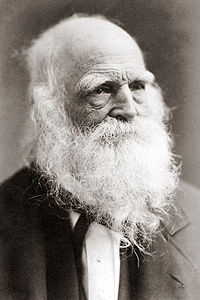The Rivulet
William Cullen Bryant 1794 (Cummington) – 1878 (New York City)
This little rill, that from the springs
Of yonder grove its current brings,
Plays on the slope a while, and then
Goes prattling into groves again,
Oft to its warbling waters drew
My little feet, when life was new,
When woods in early green were dressed,
And from the chambers of the west
The warmer breezes, travelling out,
Breathed the new scent of flowers about,
My truant steps from home would stray,
Upon its grassy side to play,
List the brown thrasher's vernal hymn,
And crop the violet on its brim,
With blooming cheek and open brow,
As young and gay, sweet rill, as thou.
And when the days of boyhood came,
And I had grown in love with fame,
Duly I sought thy banks, and tried
My first rude numbers by thy side.
Words cannot tell how bright and gay
The scenes of life before me lay.
Then glorious hopes, that now to speak
Would bring the blood into my cheek,
Passed o'er me; and I wrote, on high,
A name I deemed should never die.
Years change thee not. Upon yon hill
The tall old maples, verdant still,
Yet tell, in grandeur of decay,
How swift the years have passed away,
Since first, a child, and half afraid,
I wandered in the forest shade.
Thou ever joyous rivulet,
Dost dimple, leap, and prattle yet;
And sporting with the sands that pave
The windings of thy silver wave,
And dancing to thy own wild chime,
Thou laughest at the lapse of time.
The same sweet sounds are in my ear
My early childhood loved to hear;
As pure thy limpid waters run,
As bright they sparkle to the sun;
As fresh and thick the bending ranks
Of herbs that line thy oozy banks;
The violet there, in soft May dew,
Comes up, as modest and as blue,
As green amid thy current's stress,
Floats the scarce-rooted watercress:
And the brown ground-bird, in thy glen,
Still chirps as merrily as then.
Thou changest not--but I am changed,
Since first thy pleasant banks I ranged;
And the grave stranger, come to see
The play-place of his infancy,
Has scarce a single trace of him
Who sported once upon thy brim.
The visions of my youth are past--
Too bright, too beautiful to last.
I've tried the world--it wears no more
The colouring of romance it wore.
Yet well has Nature kept the truth
She promised to my earliest youth.
The radiant beauty shed abroad
On all the glorious works of God,
Shows freshly, to my sobered eye,
Each charm it wore in days gone by.
A few brief years shall pass away,
And I, all trembling, weak, and gray,
Bowed to the earth, which waits to fold
My ashes in the embracing mould,
(If haply the dark will of fate
Indulge my life so long a date)
May come for the last time to look
Upon my childhood's favourite brook.
Then dimly on my eye shall gleam
The sparkle of thy dancing stream;
And faintly on my ear shall fall
Thy prattling current's merry call;
Yet shalt thou flow as glad and bright
As when thou met'st my infant sight.
And I shall sleep--and on thy side,
As ages after ages glide,
Children their early sports shall try,
And pass to hoary age and die.
But thou, unchanged from year to year,
Gayly shalt play and glitter here;
Amid young flowers and tender grass
Thy endless infancy shalt pass;
And, singing down thy narrow glen,
Shalt mock the fading race of men.
Font size:
Submitted on May 13, 2011
Modified on March 05, 2023
- 3:00 min read
- 77 Views
Quick analysis:
| Scheme | AABBCCDDEEFFGGHH IIJJFFKKLL MMFFNNDXOOPPQQRRSSCCTTBB UUVVGGWWXXYYXXLL FFZZ1 1 2 2 3 3 4 4 5 5 JJLLXQ6 6 BB |
|---|---|
| Closest metre | Iambic tetrameter |
| Characters | 3,094 |
| Words | 593 |
| Stanzas | 6 |
| Stanza Lengths | 16, 10, 24, 16, 14, 10 |
Translation
Find a translation for this poem in other languages:
Select another language:
- - Select -
- 简体中文 (Chinese - Simplified)
- 繁體中文 (Chinese - Traditional)
- Español (Spanish)
- Esperanto (Esperanto)
- 日本語 (Japanese)
- Português (Portuguese)
- Deutsch (German)
- العربية (Arabic)
- Français (French)
- Русский (Russian)
- ಕನ್ನಡ (Kannada)
- 한국어 (Korean)
- עברית (Hebrew)
- Gaeilge (Irish)
- Українська (Ukrainian)
- اردو (Urdu)
- Magyar (Hungarian)
- मानक हिन्दी (Hindi)
- Indonesia (Indonesian)
- Italiano (Italian)
- தமிழ் (Tamil)
- Türkçe (Turkish)
- తెలుగు (Telugu)
- ภาษาไทย (Thai)
- Tiếng Việt (Vietnamese)
- Čeština (Czech)
- Polski (Polish)
- Bahasa Indonesia (Indonesian)
- Românește (Romanian)
- Nederlands (Dutch)
- Ελληνικά (Greek)
- Latinum (Latin)
- Svenska (Swedish)
- Dansk (Danish)
- Suomi (Finnish)
- فارسی (Persian)
- ייִדיש (Yiddish)
- հայերեն (Armenian)
- Norsk (Norwegian)
- English (English)
Citation
Use the citation below to add this poem to your bibliography:
Style:MLAChicagoAPA
"The Rivulet" Poetry.com. STANDS4 LLC, 2024. Web. 26 Apr. 2024. <https://www.poetry.com/poem/40374/the-rivulet>.



Discuss the poem The Rivulet with the community...
Report Comment
We're doing our best to make sure our content is useful, accurate and safe.
If by any chance you spot an inappropriate comment while navigating through our website please use this form to let us know, and we'll take care of it shortly.
Attachment
You need to be logged in to favorite.
Log In